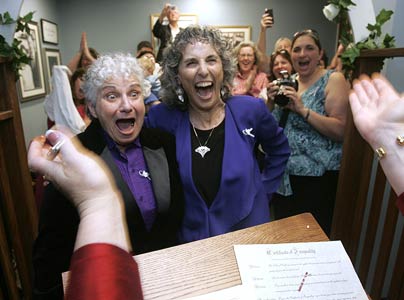Custom Search
Civil unions and partnerships are they the same as marriage?

Civil unions and domestic partnerships are similar to marriages. They offer legal recognition but the actual benefits are minimal. Many people consider civil unions, even those which grant equal rights, inadequate, as they create a separate status, and believe they should be replaced by gender-neutral marriage.
Civil unions, civil partnerships, domestic partnerships, and unregistered partnership/unregistered co-habitation or registered partnerships offer varying amounts of the benefits of marriage. They are available in: Andorra, Australia, Colombia, Croatia, the Czech Republic, Denmark, Finland, France, Germany, Hungary, Iceland, Israel, Luxembourg, New Zealand, Portugal, Slovenia, Switzerland, the United Kingdom, and Uruguay. They are also available in some parts of Argentina (Villa Carlos Paz, Río Cuarto, Ciudad de Buenos Aires, Río Negro), Mexico (Coahuila and the Federal District), and the United States (including; California, Colorado, Hawaii, Maryland, New Jersey, Nevada, Oregon, Wisconsin and Washington, and the federal District of Columbia).
In the United Kingdom, civil partnerships were introduced in 2005. The law gives civil partners identical legal status to a marriage, and partners gain all the same benefits and associated legal rights; ranging from tax exemptions and joint property rights, to next-of-kin status and shared parenting responsibilities. Partnership ceremonies are performed by a marriage registrar in exactly the same manner as a secular civil marriage. In the first year, 16,100 ceremonies took place. Civil unions in New Zealand are identical to British civil partnerships in their association with equivalent spousal rights and responsibilities to full-fledged opposite-sex marriage.
In Australia, Commonwealth law prohibits the recognition of same-sex marriage. However, all states and territories provide a range of rights to same-sex cohabiting couples, equal to those afforded to opposite-sex de facto couples. These rights are gained without registration. So any wedding service is symbolic of only. But, formal domestic partnership registries do exist in Tasmania, Victoria, and the Australian Capital Territory. Since November 2008, same-sex couples are recognized as de facto partners in a wide range of Commonwealth legislation, including superannuation, social security, health care and taxation.
Norway and Sweden did have registered partnerships, but got rid of them and then turned them into full civil marriage. In Denmark, Finland, and Iceland, a registered partnership is "nearly" equal to marriage, including legal joint adoption rights in Denmark and Iceland. Finland and Greenland have biological adoption only (no joint adoption). These partnership laws are short laws that state that wherever the word "marriage" appears in the country's law, it will now also be construed to mean "registered partnership", and wherever the word "spouse" appears, it will now also be construed to mean "registered partner" — thereby transferring the body of marriage laws onto same-sex couples in registered partnerships.
You may also want to read about
the word marriage.
© Copyright 2015 All Rights Reserved, Gayweddingvalues.com